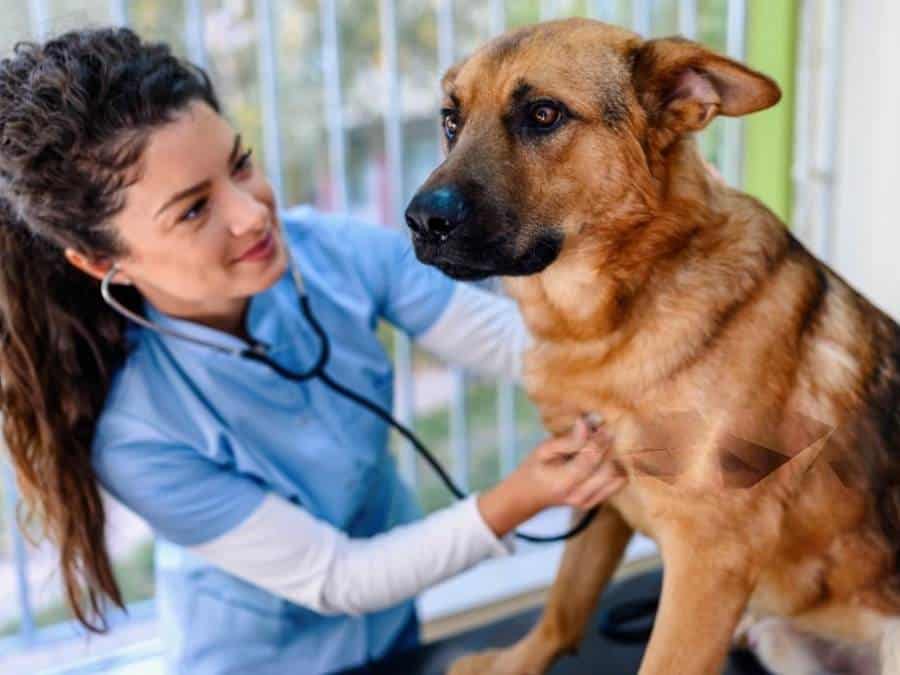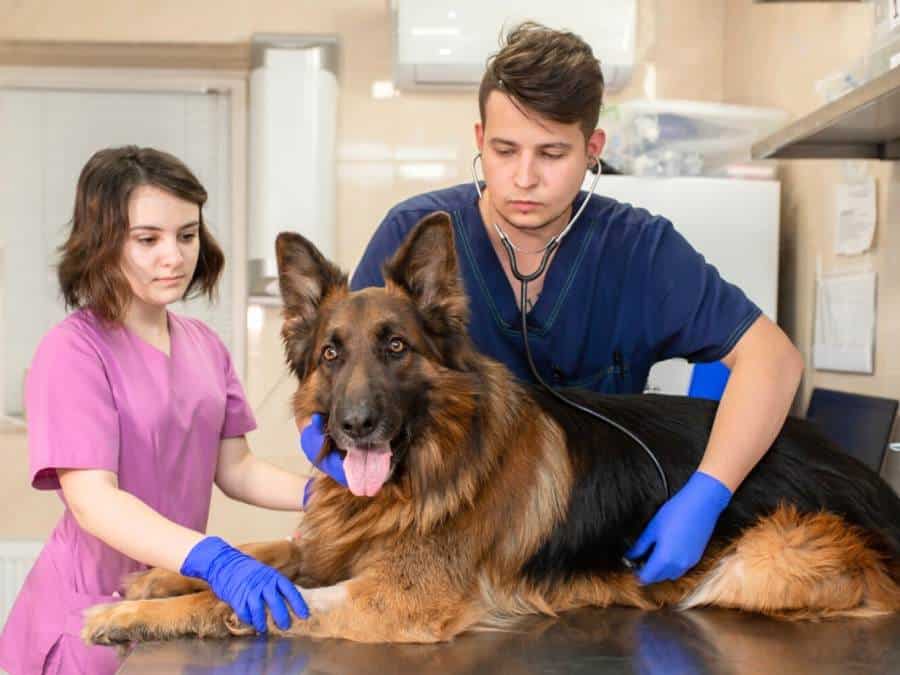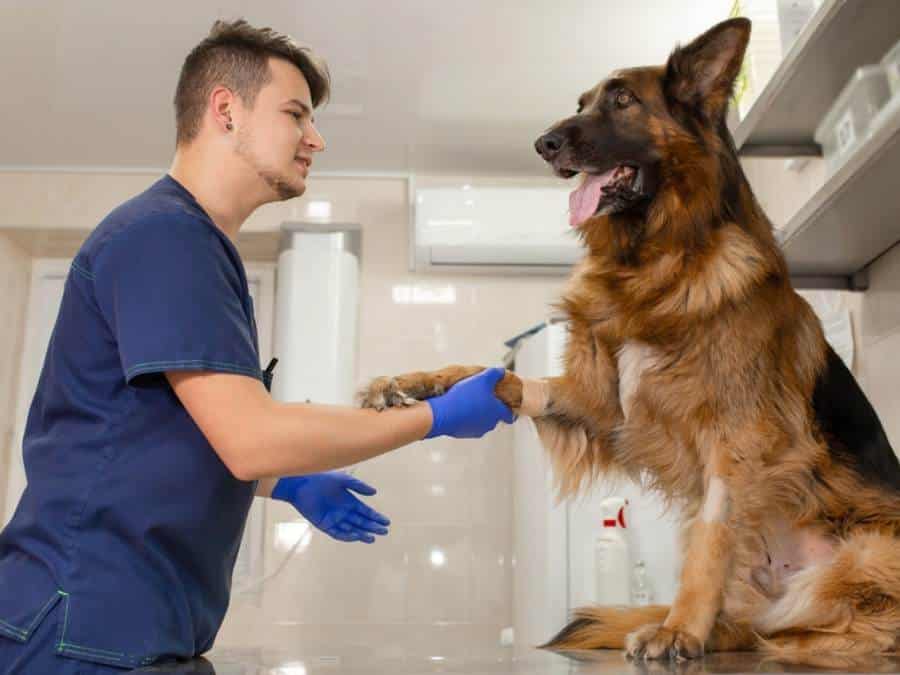Is your German Shepherd constantly suffering from digestive issues and skin problems? If so, food allergies could be the hidden culprit behind their discomfort. These allergies can wreak havoc on your furry friend’s well-being, causing a range of health concerns.
Food allergies in dogs can manifest as skin irritation, gastrointestinal problems, or even chronic ear infections. The culprits behind these reactions can be found in common ingredients like beef, chicken, grains, or dairy products.
It’s essential for proud GSD parents like us to understand the signs and symptoms of food allergies so we can take proactive measures to alleviate our child’s discomfort.
So, in today’s post, we will discuss effective strategies to manage these allergies and ensure our pup lives a happy, healthy life.
What is a Food Allergy in Dogs?
A food allergy in dogs occurs when a dog’s immune system reacts abnormally to certain proteins present in their diet. The immune system identifies these proteins as harmful invaders and responds by releasing chemicals, such as histamines, to protect the body. This immune response can lead to various symptoms and health issues. (Source)
Common signs of food allergies in dogs include:
- Skin issues: Itchy skin, redness, hives, or inflammation.
- Gastrointestinal problems: Vomiting, diarrhea, or excessive gas.
- Ear infections: Chronic ear inflammation or infections.
- Respiratory symptoms: Sneezing, coughing, or wheezing.
It’s important to distinguish between food allergies and food intolerances. Food allergies involve an immune system response, while intolerances typically result from a lack of certain digestive enzymes and don’t involve the immune system.
Common food allergens for dogs include beef, dairy, chicken, lamb, fish, eggs, soy, and wheat.

Symptoms of German Shepherd Food Allergies
If you suspect that your German Shepherd may have a food allergy, keep an eye out for these common symptoms:
1. Frequent itching, scratching, or biting at their skin
If you notice your dog constantly licking or chewing on their paws, legs, or any other part of their body, it could be a clear indication of a food allergy.
This constant itchiness can lead to redness, inflammation, and even open sores on their skin.
RELATED: German Shepherd Itchy Skin Treatment
2. Digestive symptoms such as diarrhea, vomiting, or excessive gas
If your furry friend experiences frequent bouts of diarrhea or vomiting after eating certain foods, it’s likely they have a food allergy.
If you notice that your dog has excessive gas or bloating after meals, it could also be an indicator of a food allergy.
RELATED: German Shepherd Diarrhea: Treatment & Care
3. Ear infections and chronic ear inflammation
If you notice your dog shaking their head frequently or scratching at their ears excessively, it’s important to check for signs of infection such as redness, swelling, discharge, or a foul odor.
Ear infections caused by food allergies can be quite uncomfortable for your furry friend and may require veterinary intervention.
4. Hair loss or poor coat condition
A less obvious but still significant symptom of food allergies in German Shepherds is hair loss or poor coat condition. If you notice patches of thinning hair on your dog’s body or if their coat appears dull and lackluster, it could be a result of a food allergy.
Food allergies can affect the health of your dog’s skin, leading to hair loss and an overall decline in the quality of their coat.
RELATED: German Shepherd Hot Spots: Signs & Treatment
5. Respiratory distress and anaphylaxis
In severe cases, food allergies can cause respiratory distress or even anaphylaxis in dogs. Anaphylaxis is a severe allergic reaction that can be life-threatening if not treated immediately.
Symptoms may include difficulty breathing, wheezing, swelling of the face or throat, and collapse.
If you suspect your dog is experiencing anaphylaxis due to a food allergy, it’s crucial to seek emergency veterinary care right away.
It’s important to note that these symptoms may also indicate other health issues, so it’s crucial to consult with your veterinarian for an accurate diagnosis.
Your vet will likely perform tests such as elimination diets or blood tests to identify the specific food allergens causing the reactions in your German Shepherd.
Check out this comprehensive GSD allergy guide to learn more about the 6 most common German Shepherd allergies and their treatments.
RELATED: How to Stop Your GSD from Eating Poop

Which are the common food allergens for German Shepherds?
Identifying and avoiding common food allergens is crucial to keeping your German Shepherd healthy and happy. Here are some of the most common food allergens for German Shepherds:
1. Proteins
- Beef: Beef is a common protein source in many dog foods. Allergies to beef can manifest as skin issues, digestive problems, and ear infections.
- Chicken: Chicken allergies are also relatively common. Dogs may exhibit similar symptoms as with beef allergies, including itching, gastrointestinal upset, and ear infections.
- Lamb: Although considered a novel protein source in some hypoallergenic diets, lamb can still be an allergen for some dogs.
2. Grains
- Wheat: Wheat is a common allergen for dogs, and gluten intolerance can lead to digestive issues. Some dog owners opt for grain-free diets to address potential sensitivities.
- Corn: Corn is another grain that some dogs may be allergic to. It’s often used as a filler in commercial dog foods.
3. Dairy
- Lactose: Many dogs are lactose intolerant, meaning they lack the enzyme needed to properly digest lactose found in milk and dairy products. This can lead to gastrointestinal upset.
4. Artificial Additives
- Preservatives: Artificial preservatives, such as BHA (butylated hydroxyanisole) and BHT (butylated hydroxytoluene), can cause allergic reactions in some dogs.
- Colorings and Flavorings: Artificial colors and flavors are sometimes added to enhance the palatability of dog food, but they can trigger allergies in sensitive individuals.
5. Common Fillers
- Soy: This study found that soy is sometimes used as a protein source or filler in dog food. It can be an allergen for certain dogs.
- Corn: In addition to being a grain, corn is also used as a filler in some dog foods and treats. Dogs with corn allergies may experience itching and digestive issues.
6. Fish
- Salmon and Other Fish: Fish, including salmon, is a common ingredient in many dog foods. While fish is an excellent source of omega-3 fatty acids, some dogs may be allergic to it, leading to skin problems and gastrointestinal disturbances.
Remember, every dog is unique, and what may be an allergen for one German Shepherd may not affect another. If you suspect that your German Shepherd has a food allergy, it’s important to consult with your veterinarian for proper diagnosis and guidance.
They can help you create a suitable diet plan that avoids allergens and meets your dog’s nutritional needs.

How to diagnose food allergies?
To accurately diagnose food allergies in dogs, veterinarians employ various diagnostic methods. These methods help identify the specific allergens causing adverse reactions in our furry friends.
Let’s take a closer look at how veterinarians go about diagnosing food allergies in dogs.
1. Elimination Diets
One of the primary methods used by veterinarians to diagnose food allergies is through elimination diets. This process involves removing potential allergens from the dog’s diet and gradually reintroducing them while closely monitoring any allergic reactions. Here’s how it works:
- The veterinarian will recommend a hypoallergenic diet that contains novel protein sources and carbohydrates that the dog has not been exposed to before.
- The dog will be put on this special diet for a period of 8-12 weeks, during which time their symptoms should improve if they have a food allergy.
- After this initial period, individual ingredients are reintroduced one at a time to determine which ones provoke an allergic response.
- By carefully observing the dog’s reaction to each ingredient, veterinarians can pinpoint the specific allergens causing the adverse reactions.
Elimination diets are considered highly effective because they provide concrete evidence of food allergies by directly linking symptoms with specific dietary components.
Blood Tests
In addition to elimination diets, veterinarians may also use blood tests as part of their diagnostic approach for food allergies in dogs.
These tests measure specific antibodies or allergen-specific immunoglobulin E (IgE) levels to identify potential allergens triggering an immune response within the dog’s body.
There are two commonly used types of blood tests:
- Serum Allergen-Specific IgE Test: This test measures IgE levels in response to specific allergens present in a panel of common foods or environmental triggers.
- Food Sensitivity Test: This test measures IgG and IgA antibodies to identify potential food sensitivities that may be causing adverse reactions.
While blood tests can provide valuable information, it’s important to note that they may not always yield definitive results.
False negatives and false positives are possible, which is why they are often used in conjunction with elimination diets for a more accurate diagnosis.
3. Intradermal Skin Testing
This involves injecting small amounts of potential allergens under your dog’s skin and observing their reaction. If a raised bump or redness occurs at the injection site, it suggests an allergic response to that particular allergen.

Treatment of Food Allergies in German Shepherds
To effectively manage food allergies in German Shepherds, it is crucial to avoid the identified allergens. By eliminating these triggers from their diet, you can help alleviate their symptoms and improve their overall well-being.
There are various treatment options available that can further aid in managing allergies in German Shepherds.
1. Veterinary Consultation
If you suspect your dog has a food allergy, the first step is to consult with a veterinarian. The vet will conduct a thorough examination, consider the dog’s medical history, and may recommend diagnostic tests to confirm the presence of a food allergy.
2. Elimination Diet
The most common method for identifying food allergies in dogs is through an elimination diet. This involves feeding the dog a novel protein and carbohydrate source that they have not been exposed to before.
Common choices include venison, rabbit, duck, or other novel proteins, along with a carbohydrate like sweet potato or pea.
3. Hydrolyzed Diets
Hydrolyzed diets involve proteins that have been broken down into smaller components, making them less likely to trigger an allergic response.
These diets are designed to be hypoallergenic and can be a useful option for dogs with food allergies.

4. Limited-Ingredient Diets (LID)
Limited-ingredient diets contain a minimal number of ingredients, reducing the likelihood of triggering an allergic reaction.
These diets often feature novel protein and carbohydrate sources and avoid common allergens.
5. Home-Cooked Diets
Some pet owners choose to prepare home-cooked meals for their dogs using ingredients known to be hypoallergenic.
This allows for better control over the dog’s diet, but it’s essential to ensure the diet is nutritionally balanced.
6. Avoidance of Allergens
Once the allergen is identified, it’s crucial to eliminate it from the dog’s diet completely. This includes avoiding treats, table scraps, and any other sources of the allergen.
7. Supplements
In some cases, veterinarians may recommend supplements such as omega-3 fatty acids to support skin health and reduce inflammation associated with allergies.
8. Prescription Medications
In severe cases, where the dog is experiencing significant discomfort or complications, veterinarians may prescribe medications such as antihistamines, corticosteroids, or immunosuppressants to manage symptoms.
However, these are typically short-term solutions due to potential side effects.
9. Immunotherapy
Immunotherapy, also known as allergy shots or desensitization therapy, is another option for treating allergies in German Shepherds. This treatment involves injecting small amounts of specific allergens into your dog’s body over time.
The goal is to gradually desensitize their immune system and reduce their sensitivity to those particular allergens.
It’s important to note that the effectiveness of the treatment plan may vary from one dog to another. Patience is key, as it may take several weeks on a new diet to see improvements. Additionally, strict adherence to the prescribed diet is crucial to prevent accidental exposure to the allergen.

How to prevent food allergies in German Shepherds?
While it’s not always possible to completely prevent food allergies in dogs, there are measures you can take to reduce the likelihood of your dog developing allergies and to manage their diet to minimize the risk. Here are some preventive measures:
- Diverse diet during puppyhood:
- Introduce a variety of high-quality dog foods during your puppy’s formative months. A diverse diet may help reduce the risk of developing sensitivities to specific ingredients.
- Avoid common allergens:
- Be aware of common allergens such as beef, chicken, dairy, and grains. If possible, choose dog foods that do not contain these ingredients. Alternatively, consider rotating protein sources to minimize the risk of developing allergies to specific proteins.
- Limited ingredient diets:
- Consider feeding your dog a limited-ingredient diet (LID) from an early age. These diets contain a minimal number of ingredients, making it less likely for your dog to develop allergies.
- Avoid fillers and artificial additives:
- Choose dog foods that do not contain common fillers like corn and soy. Additionally, opt for foods that are free from artificial colors, flavors, and preservatives, as these can contribute to allergic reactions in some dogs.
- Grain-free options:
- Some dogs may benefit from grain-free diets, especially if they have sensitivities to wheat or other grains. However, it’s essential to note that the relationship between grain-free diets and heart disease in dogs is a subject of ongoing research, so it’s advisable to consult with your veterinarian before making dietary changes.
- Regular vet check-ups:
- Schedule regular veterinary check-ups to monitor your dog’s overall health and discuss their diet. Your veterinarian can provide guidance on suitable nutrition and identify any signs of potential allergies early on.
- Gradual introductions:
- When introducing new foods or treats, do so gradually. This helps prevent overwhelming your dog’s system and allows you to observe for any adverse reactions.
- Home-cooked meals:
- If you have the time and resources, consider preparing balanced, home-cooked meals for your dog. This allows you to have better control over the ingredients and avoid potential allergens.
- Monitor for signs of allergies:
- Be vigilant for any signs of food allergies, such as itching, gastrointestinal upset, or changes in behavior. If you notice any concerning symptoms, consult with your veterinarian promptly.
- Rotate protein sources:
- If you feed your dog commercially prepared dog food, consider rotating protein sources to expose your dog to a variety of meats. This can help prevent the development of sensitivities to a specific protein.

Best diets for German Shepherds with food allergies
If your German Shepherd is suffering from skin or food allergies, finding the right food can make a world of difference in their comfort and overall well-being.
Here are some key factors to consider when selecting the best food for German Shepherds with food allergies.
1. Hypoallergenic Diets & Limited Ingredient Diets
Switching to hypoallergenic diets or limited-ingredient diets can be highly beneficial for managing food allergies in dogs.
These specialized diets are formulated with novel protein sources and have carefully selected ingredients that are less likely to trigger an allergic response.
Hypoallergenic diets are designed to minimize the risk of triggering an allergic reaction by using proteins that your dog has not been exposed to before.
Limited ingredient diets (LID), on the other hand, contain a reduced number of ingredients, making it easier to identify and avoid potential allergens.
Pros:
- Novel protein sources reduce the risk of triggering allergic reactions.
- LIDs focus on simplicity and eliminate potential allergens found in other dog foods.
Cons:
- Limited availability and higher cost compared to traditional dog foods.
- It may take time to find the specific novel protein source that works best for your German Shepherd.
2. Grain-Free Options
Grains like wheat, corn, and soy are common allergens that can contribute to skin issues in dogs. Therefore, opting for grain-free dog food might be beneficial for German Shepherds with grain sensitivities causing their skin allergies.
Grain-free options typically use alternative carbohydrate sources like sweet potatoes or peas instead of grains.
Pros:
- Reduces exposure to common allergens found in grains.
- Provides alternative carbohydrate sources that are easier to digest.
Cons:
- Some recent studies suggest a possible link between grain-free diets and heart disease in certain breeds. Consult with your veterinarian before making any dietary changes.
- Grain-free options may be more expensive than traditional dog foods.
3. Hypoallergenic Dog Foods
Hypoallergenic dog foods are specifically formulated for dogs with food sensitivities. These foods contain highly digestible ingredients that minimize the risk of triggering allergic reactions.
They often feature novel protein sources and exclude common allergens such as beef, chicken, wheat, soy, and dairy products.
Pros:
- Formulated to alleviate symptoms of skin allergies in dogs.
- Minimizes exposure to common allergens.
Cons:
- Can be more expensive than other dog food options.
- It may take some trial and error to find the right hypoallergenic formula for your German Shepherd.
When selecting a hypoallergenic dog food for your German Shepherd, it’s important to carefully read the ingredient list and ensure it aligns with their specific dietary needs.
Conclusion
You have now gained a comprehensive understanding of German Shepherd food allergies and how to manage them. By recognizing the symptoms, seeking a proper diagnosis from a veterinarian, and implementing the right treatment plan, you can ensure your furry friend leads a happy and healthy life.
By prioritizing your dog’s nutrition and well-being, you can alleviate their discomfort caused by food allergies. Stay proactive in monitoring their reactions and be patient throughout the process of finding the right solution.
Frequently Asked Questions (FAQs)
1. Can German Shepherds have food allergies?
Yes, German Shepherds can definitely have food allergies, just like any other dog breed. Allergies occur when a dog’s immune system reacts negatively to certain ingredients in their food.
2. What are the common symptoms of food allergies in German Shepherds?
If your German Shepherd has a food allergy, you may notice symptoms such as itching, excessive scratching, redness or inflammation of the skin, gastrointestinal issues like diarrhea or vomiting, and even ear infections. These symptoms can vary from mild to severe.
3. What are some common food allergens for German Shepherds?
German Shepherds can be allergic to various ingredients commonly found in dog food. Some common allergens include beef, chicken, dairy products (like cheese), wheat, soy, and corn. However, it’s important to note that every dog is different and may have individual sensitivities.
4. How can I determine if my German Shepherd has a food allergy?
If you suspect your German Shepherd has a food allergy, it’s best to consult with your veterinarian. They may recommend an elimination diet where you gradually remove potential allergens from your dog’s diet and monitor their response.
5. What should I do if my German Shepherd has a food allergy?
If your German Shepherd is diagnosed with a food allergy, the most effective solution is to switch them to a hypoallergenic or limited-ingredient diet recommended by your vet. These specialized diets are formulated to avoid common allergens while still providing essential nutrients for your dog’s overall health.
Also read:




